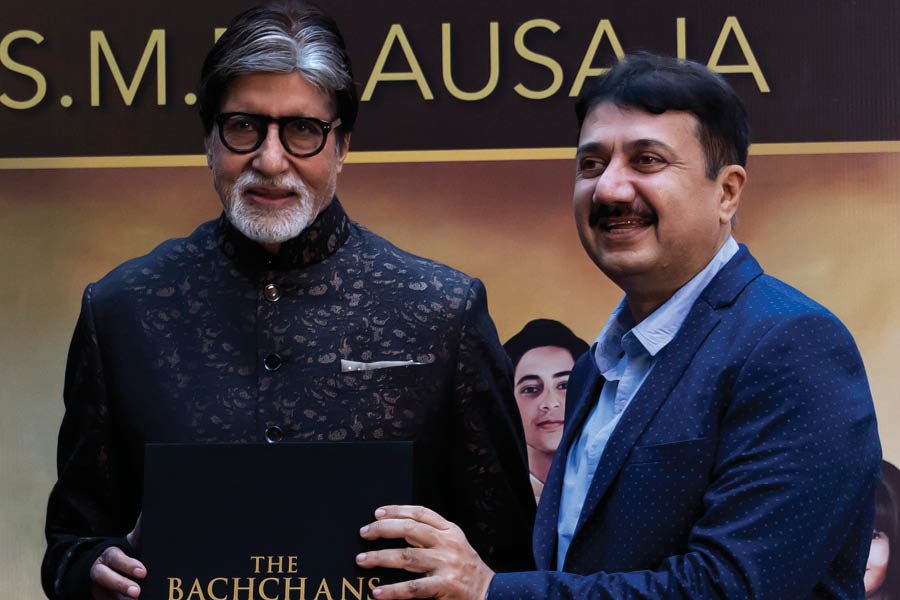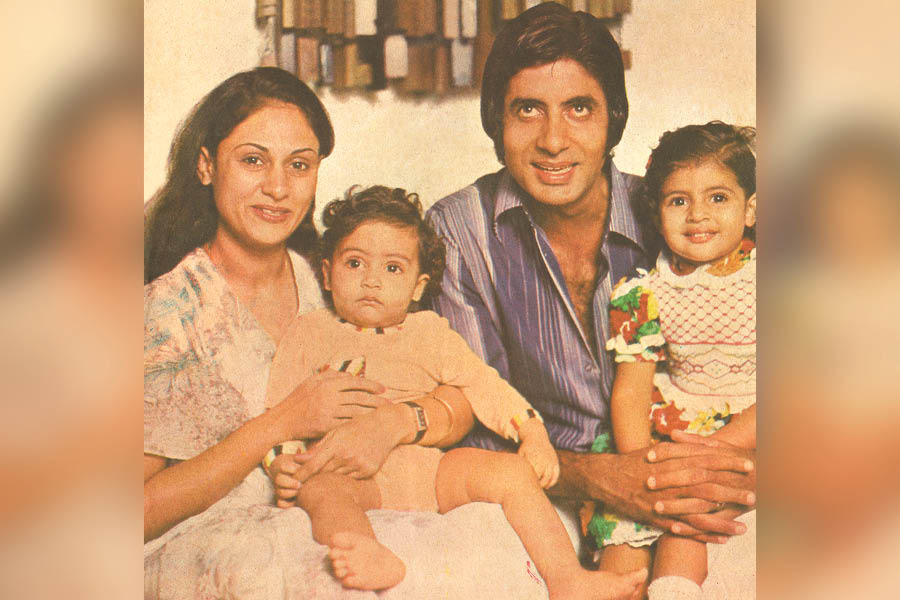He has waited a long time for this. Twelve long years. I came to the book in early 2022 and put my efforts behind it over the next year and a half. And the wait seems to have paid off. ‘The Bachchans: A Saga of Excellence’ is a work of art. A sumptuous pictorial telling of an artistic family. A gorgeous coffee table book that provides a visual extravaganza like no other.
Books on Amitabh Bachchan are a dime a dozen. What sets The Bachchans – the book, not the family, which too stands tall in the cultural landscape of India – apart is that this is the first time a book has chronicled the entire family. From Harivansh and Teji Bachchan to Abhishek and Aishwarya. And if, understandably so, Amitabh Bachchan hogs the limelight, you also have nuggets about the relationship between his parents, with Sarojini Naidu memorably introducing Harivansh Rai and Teji to the Nehru family as “the poet and the poem”.
These early portions, covering the origins of the family, make up some of the best parts of the book. We have the heart-warming anecdote of Harivansh and Teji attending Indira and Feroze Gandhi’s marriage. On Sarojini Naidu’s insistence, the couple recited a poem as a duet – ‘Varsh nav, harsh nav’ (A new year, a novel happiness) to the elite gathering. Twenty-six years later, they would recite the same poem at Rajiv Gandhi and Sonia Maino’s wedding.
Fittingly enough, the book was released at the Bachchans’ family home in Mumbai on the day the new generation stepped in front of the arc lights. On December 8, 2023, even as Amitabh Bachchan made S.M.M. Ausaja’s 12-year dream come true, Agastya Nanda (who has the closing spread in the book) debuted with the Netflix film, The Archies. The saga of excellence that started with Harivansh Rai Bachchan in the early years of the 20th century, comes full circle with a spread that celebrates Agastya and Navya Naveli (Amitabh and Jaya’s grandchildren) and Shweta (the Bachchans’ daughter) coming into the limelight.
It is an incredible feat that Ausaja has pulled off. Here’s a man the Bachchans turn to when they need photographs they do not possess. Apart from the incredible images he has sourced, what makes this work big time are also the extracts from various reviews of films of the 1970s and ’80s starring Amitabh and Jaya. For a film buff, getting to read reviews in now-defunct magazines like Cine Advance, Picturpost and Mother India is a huge kick. As also rare features and interviews, and even Mr Taroon Bhaduri and Mrs Indira Bhaduri’s invitation to the marriage reception of their daughter. There’s K.A. Abbas’s account of his first encounter with Amitabh Bachchan, there’s a scintillating Sonia Gandhi interview, her first, to Hindi magazine Dharamyug, in which she spoke about the Bachchans, there are rare posters and artworks and never-before-seen pictures that make this a veritable collector’s edition.
The soft-spoken and unassuming Ausaja – who has two previous books to his name and whose exhibition on Amitabh Bachchan’s 80th birthday I attended and whose collection I am privy to – spoke to me on the book.
How did the idea for the book The Bachchans originate? Why did you want a book on the whole family?
S.M.M. Ausaja: Being an avid archivist since my school and college days in Kanpur and Lucknow, I had amassed enough memorabilia on the superstar to do something meaningful. Initially I tried exhibitions, but the corporates wanted celebrities to unveil the event, they had no interest in the content going on display, but only on footfalls. Consequently I decided on the book, considering its potential to reach pan-India and beyond, unlike an exhibition which gets limited to a venue in a city for just an evening.
In fact, the project was initiated by my wife Mona who shot the first email to the publisher. There have been several books on Amit-ji in various languages, so I decided to come out with the first book on the Bachchan family, considering there is so much talent across the three generations, and I had enough information and visuals to do justice to such a theme.

Amitabh Bachchan and author S.M.M. Ausaja at the book launch. S.M.M. Ausaja
Give us an insight into your personal fan memories of growing up on Bachchan and his films.
S.M.M. Ausaja: His star power hit me when I was in Class 4, during a school trip to Agra where we saw Manmohan Desai’s Suhaag. The spell continues. I began collecting memorabilia with postcards, magazines and posters, and expanded after my Mumbai phase in the late 1990s. I have witnessed the hysteria as his films opened, the police controlling crowds, the black-market boys thriving, school friends bragging about first-day tickets. I have also seen how Indians transcending cultural, religious and geographical lines, prayed for his recovery after the 1982 accident that made front-page news across the major dailies for two months. The India Today cover ‘One Man Industry’ actually sums up the man’s absolute sway on the masses, on the collective psyche of youth, on the box-office in the 1970s and ’80s. His hairstyle and his knotted shirt were style statements. His concerts abroad in the 1980s were phenomenal, reaffirming his global impact, which eventually won him the ‘Star of the Millennium’ poll initiated by BBC.
Do you recall your first meeting with Amitabh Bachchan? And then the rest of the family?
S.M.M. Ausaja: I glimpsed him during the shooting of Mrityudaata in 1996 at Hotel Horizon in Juhu, Mumbai. I first met him officially at Jalsa when we did the Vijay concert in Srinagar, an initiative of the Vajpayee government, where I handled production for Rahul Mahajan’s company. Since then, I have been in touch with him. I met the rest of the family when I did his 70th birthday exhibition, an initiative of Mrs Jaya Bachchan titled B70, which showcased 70 artworks from noted artists, and my exhibition of posters. Interestingly, with his support I have the honour of doing three of the biggest exhibitions on his three milestone years: 70th, 75th and 80th.
What was his reaction to the book?
S.M.M. Ausaja: Amit-ji saw the book and smiled. He took almost an hour going through it page by page. He is a man of few words. He wrote some lines in his cryptic style on the day he saw the dummy. But eventually allowing the book to be released at his home speaks volumes of his trust and appreciation.
Give us an idea of how you went about collecting the material for the book. Any defining moments that stand out?
S.M.M. Ausaja: The material got collected by default, as it started as a fan collection. Over time, the madness acquired some method. Getting original memorabilia is very difficult. There’s very little out there and whatever you get is very expensive. The defining moments have been the following acquisitions: the image of Pandit Jawaharlal Nehru with the Bachchans, images of Jaya Bachchan’s early films from the FTII, an image of Rajiv and Sanjay Gandhi with Amitabh during their schooldays, very rare photos of Dr Harivansh Rai Bachchan’s Beirut trip with writer Sajjad Zaheer and other literary giants, the first cover artwork of Madhushala….
How do you go about your work as an archivist and collector, what does the process involve?
S.M.M. Ausaja: Collection is a difficult and expensive process. It requires a missionary zeal and focus. Over the years, I have met collectors, sellers, journalists, distributors and junk dealers of all kinds. But the journey has been interesting, and it has given me visuals that I believe are unique in the country. And I have amassed film memorabilia en masse. So, it wouldn’t surprise you if I say I now have visuals spanning 100-plus years of Indian cinema, including the silent era. I have learnt a lot from the late Feroze Rangoonwalla, who was my guru and who helped me enrich my collection. Preserving memorabilia is also an uphill task.
What next after The Bachchans?
S.M.M. Ausaja: Amit-ji has asked me to work on other luminaries as well. I intend to take his words seriously!
(Shantanu Ray Chaudhuri is a film and music buff, editor, publisher, film critic and writer)










